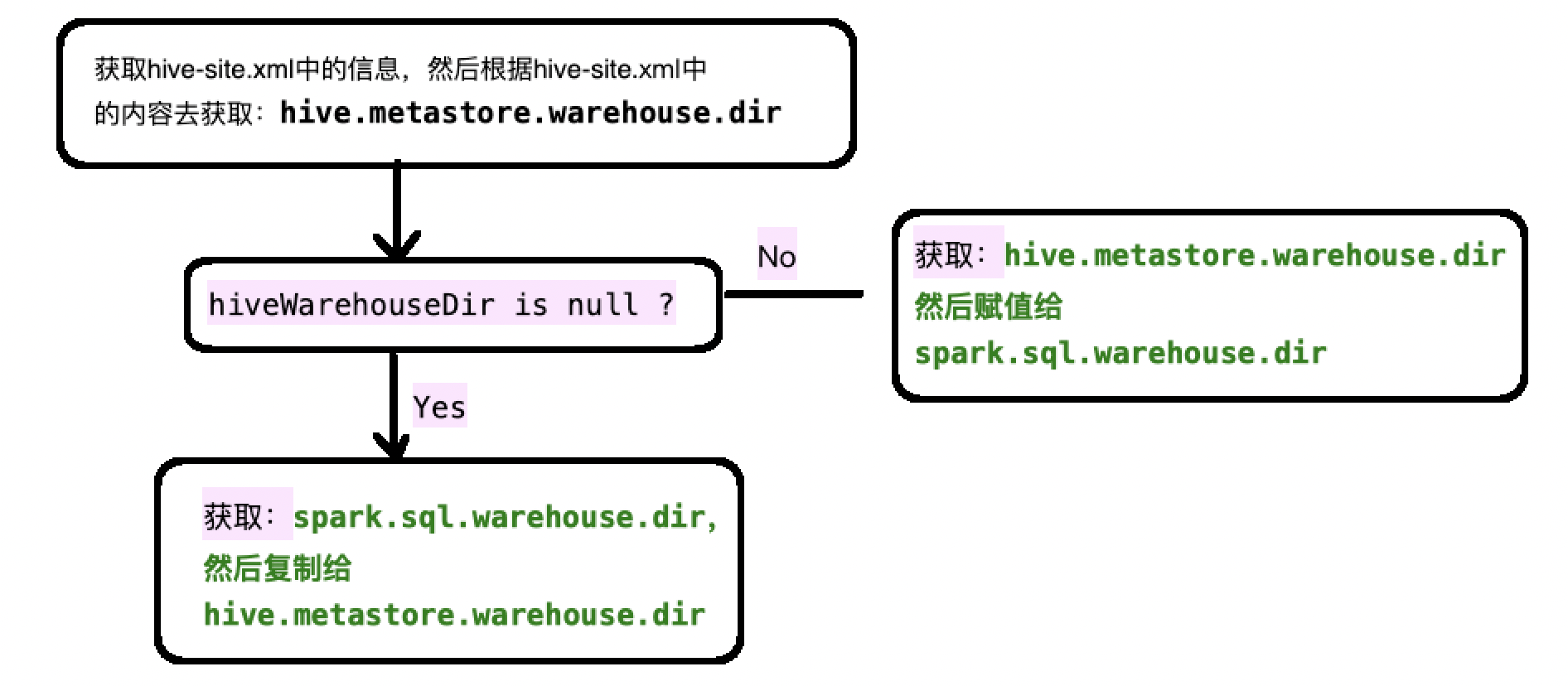关于hive on spark会话的共享状态
spark sql中有一个类:
org.apache.spark.sql.internal.SharedState
它是用来做:
1、元数据地址管理(warehousePath) 2、查询结果缓存管理(cacheManager) 3、程序中的执行状态和metrics的监控(statusStore) 4、默认元数据库的目录管理(externalCatalog) 5、全局视图管理(主要是防止元数据库中存在重复)(globalTempViewManager)
1:首先介绍元数据地址管理(warehousePath)
这块儿主要是获取spark sql元数据库的路径地址,那么一般情况,我们都是默认把hive默认作为spark sql的元数据库,因为
它首先去加载hive的配置文件"hive-site.xml" , 然后根据hive-site.xml中获取的信息来获取到hive元数据库的路径:
hive.metastore.warehouse.dir
那么有时候,我们不使用hive作为spark sql的元数据库,那么这个时候我们加载的hive元数据路径应该是null
val hiveWarehouseDir = sparkContext.hadoopConfiguration.get("hive.metastore.warehouse.dir")
如果hiveWarehouseDir是null,那么就去加载spark sql的自带的元数据管理地址(spark.sql.warehouse.dir),然后把这个地址的值赋予给hive.metastore.warehouse.dir
因此大概流程就是获取hiveWarehouseDir:

具体代码:

val warehousePath: String = { val configFile = Utils.getContextOrSparkClassLoader.getResource("hive-site.xml") if (configFile != null) { logInfo(s"loading hive config file: $configFile") sparkContext.hadoopConfiguration.addResource(configFile) } // hive.metastore.warehouse.dir only stay in hadoopConf sparkContext.conf.remove("hive.metastore.warehouse.dir") // Set the Hive metastore warehouse path to the one we use val hiveWarehouseDir = sparkContext.hadoopConfiguration.get("hive.metastore.warehouse.dir") if (hiveWarehouseDir != null && !sparkContext.conf.contains(WAREHOUSE_PATH.key)) { // If hive.metastore.warehouse.dir is set and spark.sql.warehouse.dir is not set, // we will respect the value of hive.metastore.warehouse.dir. sparkContext.conf.set(WAREHOUSE_PATH.key, hiveWarehouseDir) logInfo(s"${WAREHOUSE_PATH.key} is not set, but hive.metastore.warehouse.dir " + s"is set. Setting ${WAREHOUSE_PATH.key} to the value of " + s"hive.metastore.warehouse.dir ('$hiveWarehouseDir').") hiveWarehouseDir } else { // If spark.sql.warehouse.dir is set, we will override hive.metastore.warehouse.dir using // the value of spark.sql.warehouse.dir. // When neither spark.sql.warehouse.dir nor hive.metastore.warehouse.dir is set, // we will set hive.metastore.warehouse.dir to the default value of spark.sql.warehouse.dir. val sparkWarehouseDir = sparkContext.conf.get(WAREHOUSE_PATH) logInfo(s"Setting hive.metastore.warehouse.dir ('$hiveWarehouseDir') to the value of " + s"${WAREHOUSE_PATH.key} ('$sparkWarehouseDir').") sparkContext.hadoopConfiguration.set("hive.metastore.warehouse.dir", sparkWarehouseDir) sparkWarehouseDir } } logInfo(s"Warehouse path is '$warehousePath'.")
2:CacheManager
将查询结果缓存起来 ; 这样的好处就是,如果后面还需要本次查询出来的内容,就不需要在查询一遍数据源了(这块儿有时间单独写篇文章记录)
具体代码:

/** * Class for caching query results reused in future executions. */ val cacheManager: CacheManager = new CacheManager
3:statusStore
代码:

/** * A status store to query SQL status/metrics of this Spark application, based on SQL-specific * [[org.apache.spark.scheduler.SparkListenerEvent]]s. */ val statusStore: SQLAppStatusStore = { val kvStore = sparkContext.statusStore.store.asInstanceOf[ElementTrackingStore] val listener = new SQLAppStatusListener(sparkContext.conf, kvStore, live = true) sparkContext.listenerBus.addToStatusQueue(listener) val statusStore = new SQLAppStatusStore(kvStore, Some(listener)) sparkContext.ui.foreach(new SQLTab(statusStore, _)) statusStore }
这段代码其实说白了就是将sql的状态和一些metrics指标写入到监听器中。
那么问题来了,监听器一定是实时的去监听的(读取的),然后spark sql还要不断的往监听器中写入,那么按照传统的list,map这种结构,在读取数据的时候还要在修改结构,会出现错误的;
因此spark sql采用了写时复制容器:
private[this] val listenersPlusTimers = new CopyOnWriteArrayList[(L, Option[Timer])]
将信息不断的写入同时,还不影响读取;
4、externalCatalog
获取spark 会话的内部目录(就是hiveWarehouseDir),如果不存在的话,就按照hiveWarehouseDir创建一个 , 当然,spark会通过回调函数的方式去监控当前目录中的事件:
externalCatalog.addListener(new ExternalCatalogEventListener { override def onEvent(event: ExternalCatalogEvent): Unit = { sparkContext.listenerBus.post(event) } })
此处代码:

/** * A catalog that interacts with external systems. */ lazy val externalCatalog: ExternalCatalog = { val externalCatalog = SharedState.reflect[ExternalCatalog, SparkConf, Configuration]( SharedState.externalCatalogClassName(sparkContext.conf), sparkContext.conf, sparkContext.hadoopConfiguration) val defaultDbDefinition = CatalogDatabase( SessionCatalog.DEFAULT_DATABASE, "default database", CatalogUtils.stringToURI(warehousePath), Map()) // Create default database if it doesn't exist if (!externalCatalog.databaseExists(SessionCatalog.DEFAULT_DATABASE)) { // There may be another Spark application creating default database at the same time, here we // set `ignoreIfExists = true` to avoid `DatabaseAlreadyExists` exception. externalCatalog.createDatabase(defaultDbDefinition, ignoreIfExists = true) } // Make sure we propagate external catalog events to the spark listener bus externalCatalog.addListener(new ExternalCatalogEventListener { override def onEvent(event: ExternalCatalogEvent): Unit = { sparkContext.listenerBus.post(event) } }) externalCatalog }
5、
此处就是防止spark执行过程中的临时数据库出现在externalCatalog中,因为如果spark的GLOBAL_TEMP_DATABASE出现在externalCatalog中的话。那么随着程序的执行,下一个线程想要获取元数据库地址的时候,就没法在里面创建hiveWarehouseDir。因此,如果在externalCatalog中存在GLOBAL_TEMP_DATABASE,那么就抛异常

/** * A manager for global temporary views. */ lazy val globalTempViewManager: GlobalTempViewManager = { // System preserved database should not exists in metastore. However it's hard to guarantee it // for every session, because case-sensitivity differs. Here we always lowercase it to make our // life easier. val globalTempDB = sparkContext.conf.get(GLOBAL_TEMP_DATABASE).toLowerCase(Locale.ROOT) if (externalCatalog.databaseExists(globalTempDB)) { throw new SparkException( s"$globalTempDB is a system preserved database, please rename your existing database " + "to resolve the name conflict, or set a different value for " + s"${GLOBAL_TEMP_DATABASE.key}, and launch your Spark application again.") } new GlobalTempViewManager(globalTempDB) }



